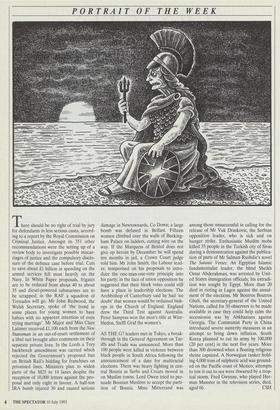PORTRAIT OF THE WEEK
There should be no right of trial by jury for defendants in less serious cases, accord- ing to a report by the Royal Commission on Criminal Justice. Amongst its 351 other recommendations were the setting up of a review body to investigate possible miscar- riages of justice and the compulsory disclo- sure of the defence case before trial. Cuts to save about £1 billion in spending on the armed services fell most heavily on the Navy. In White Paper proposals, frigates are to be reduced from about 40 to about 35 and diesel-powered submarines are to be scrapped; in the RAF a squadron of Tornados will go. Mr John Redwood, the Welsh Secretary, spoke of 'the trend in some places for young women to have babies with no apparent intention of even trying marriage'. Mr Major and Miss Clare Latimer received £1,100 each from the New Statesman in an out-of-court settlement of a libel suit brought after comments on their separate private lives. In the Lords a Tory backbench amendment was carried which rejected the Government's proposed ban on British Rail's bidding for franchises on privatised lines. Ministers plan to widen parts of the M25 to 14 lanes despite the reception of 10,000 letters against the pro- posal and only eight in favour. A half-ton IRA bomb injured 30 and caused serious
damage in Newtownards, Co Down; a large bomb was defused in Belfast. Fifteen women climbed over the walls of Bucking- ham Palace on ladders, cutting wire on the way. If the Marquess of Bristol does not give up heroin by December he will spend ten months in jail, a Crown Court judge told him. Mr John Smith, the Labour lead- er, temporised on his proposals to intro- duce the one-man-one-vote principle into his party; in the face of union opposition he suggested that their block votes could still have a place in leadership elections. The Archbishop of Canterbury said he had 'no doubt' that women would be ordained bish- ops in the Church of England. England drew the Third Test against Australia. Peter Sampras won the men's title at Wim- bledon, Steffi Graf the women's.
AS THE G7 leaders met in Tokyo, a break- through in the General Agreement on Tar- iffs and Trade was announced. More than 100 people were killed in violence between black people in South Africa following the announcement of a date for multiracial elections. There was heavy fighting in cen- tral Bosnia as Serbs and Croats moved in on Muslim towns. Lord Owen tried to per- suade Bosnian Muslims to accept the parti- tion of Bosnia. Mme Mitterrand was
among those unsuccessful in calling for the release of Mr Vuk Draskovic, the Serbian opposition leader, who is sick and on hunger strike. Enthusiastic Muslim mobs killed 35 people in the Turkish city of Sivas during a demonstration against the publica- tion of parts of Mr Salman Rushdie's novel The Satanic Verses. An Egyptian Islamic fundamentalist leader, the blind Sheikh Omar Abderahman, was arrested by Unit- ed States immigration officials; his extradi- tion was sought by Egypt. More than 20 died in rioting in Lagos against the annul- ment of the elections. Mr Boutros Boutros Ghali, the secretary-general of the United Nations, called for 50 observers to be made available in case they could help calm the secessionist war by Abkhazians against Georgia. The Communist Party in China introduced severe austerity measures in an attempt to bring down inflation. South Korea planned to cut its army by 100,000 (20 per cent) in the next five years. More than 300 drowned when a floating religious shrine capsized. A Norwegian tanker hold- ing 4,000 tons of sulphuric acid was ground- ed on the Pacific coast of Mexico; attempts to tow it out to sea were thwarted by a trop- ical storm. Fred Gwynne, who played Her- man Munster in the television series, died,


















































 Previous page
Previous page